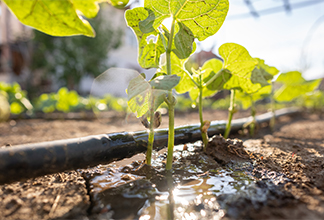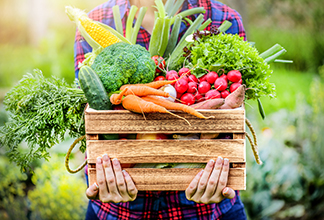How Harvesting New Skills Can Transform Agriculture
Written by The Content Team
Published on September 10, 2019
minute read
Share:
There's a fourth agricultural revolution in the works and this time it's all about data.
From innovations in seeds, fertilizer and machines in the 1900s, to the rise of diesel- and gas-powered tractors by the middle of the 20th century and the arrival of software and crop-genetics advances into the 1980s, farm and food-production skills have gone through incredible transformations. Now, data is set to fuel the next revolution.
Farmer 4.0, a new report from RBC, takes a deep dive into the skills revolution needed to transform agriculture. Drawing on labour-force data, trends, and global innovations, plus interviews with farmers, educators and agriculture authorities across Canada, RBC's economics and thought leadership team helps us understand what a new skills agenda could look like.
__________________________________________________________________________________________________________
Farmer 4.0: How the Coming Skills Revolution Can Transform Agriculture
By John Stackhouse
As Canadian farmers leave traditional tasks to smart machines, and focus on strategy and systems, they'll be better positioned than ever to feed a fast-growing global population. But to do that, they'll need a wide range of new skills, as well as enhanced old skills, that Canada isn't developing anywhere near fast enough.
According to Farmer 4.0, a new RBC report, the country could be short critical skills – data analysis, robotics and global sales, among them – that will be needed to transform the sector across a projected shortage of 123,000 agricultural workers by 2030. However, with the correct skills mix, agriculture could add another $11 billion to Canada's GDP and make the sector more productive than auto manufacturing and aerospace combined.
Farmer 4.0 is the result of a four-month study by researchers and economists on the changing skills demands in agriculture, which combines data analysis with interviews with people on the front lines of the farming revolution.
The report found that Canadian farmers are at the intersection of a demographic and technological revolution. By 2025, one in four farmers will be 65 or older, with 110,000 expected to retire in the coming decade. Meanwhile, fewer young people than ever are entering agriculture.
Farmer 4.0 also analyzed the emergence of advanced technologies across a range of agricultural sub-sectors, and found they will not reduce employment in the near term but will change the skills needed over the decade by farms, aquaculture, vineyards and greenhouses.
The report found 14% of producers automated tasks last year, and the sector spent four times as much per worker on machinery as the overall economy did. But even though 95% of large producers reported using advanced technologies, Canada's share of agtech investment was just 3.4% in 2018.
Using a model of skills clusters developed in Humans Wanted, a 2018 report from RBC, Farmer 4.0 presents five categories of agriculture workers that will be affected in very different ways by technology:
- The most critical group, farm owners and operators that we've described as "deciders," will need the digital expertise, leadership abilities and critical thinking skills to manage ever-larger and more complex operations.
- A second group of skilled workers who service farm equipment will need to focus on increasingly smart machines, meaning they'll have to develop the technological skills to tool robots and write code. The report estimates Canada will need another 25,000 such people, known as "enablers," with software knowledge, business acumen and communications skills.
- A third group known as "specialists," with a particular knowledge of scientific fields such as genetics, blockchain and artificial intelligence, will create 18,000 more jobs.
One of the biggest challenges for policymakers will be among low-skilled labour roles, which are projected to account for 85,000 of the total shortages by 2030. The demand for such positions, which include fruit picking and planting, will become more acute in the short term – and more automatable in the long term. The transition will require a new approach to immigration and reskilling, among other policies.
Farmer 4.0 highlights innovations in countries such as the Netherlands, Australia and Israel, where agriculture education is at the cutting edge of those countries' innovation agendas, and calls on Canada to adopt a new mix of farm skills that is more data-focused, innovation-minded and diverse. Among the recommendations in the report is a national skills strategy, including a push for more young people to enter the sector.
Agriculture will be central to Canada's future health and prosperity. With the right mix of skills and technologies, Canadian farmers can help feed the world and grow Canada's economy.
RBC Direct Investing Inc. and Royal Bank of Canada are separate corporate entities which are affiliated. RBC Direct Investing Inc. is a wholly owned subsidiary of Royal Bank of Canada and is a Member of the Canadian Investment Regulatory Organization and the Canadian Investor Protection Fund. Royal Bank of Canada and certain of its issuers are related to RBC Direct Investing Inc. RBC Direct Investing Inc. does not provide investment advice or recommendations regarding the purchase or sale of any securities. Investors are responsible for their own investment decisions. RBC Direct Investing is a business name used by RBC Direct Investing Inc. ® / ™ Trademark(s) of Royal Bank of Canada. RBC and Royal Bank are registered trademarks of Royal Bank of Canada. Used under licence.
© Royal Bank of Canada 2025.
Any information, opinions or views provided in this document, including hyperlinks to the RBC Direct Investing Inc. website or the websites of its affiliates or third parties, are for your general information only, and are not intended to provide legal, investment, financial, accounting, tax or other professional advice. While information presented is believed to be factual and current, its accuracy is not guaranteed and it should not be regarded as a complete analysis of the subjects discussed. All expressions of opinion reflect the judgment of the author(s) as of the date of publication and are subject to change. No endorsement of any third parties or their advice, opinions, information, products or services is expressly given or implied by RBC Direct Investing Inc. or its affiliates. You should consult with your advisor before taking any action based upon the information contained in this document.
Furthermore, the products, services and securities referred to in this publication are only available in Canada and other jurisdictions where they may be legally offered for sale. Information available on the RBC Direct Investing website is intended for access by residents of Canada only, and should not be accessed from any jurisdiction outside Canada.
Explore More

How Soil Carbon Can Become Canadian Farmers' Next Cash Crop
Sustainable practices may mean untapped profits for Canadian farmers, says RBC Economics and Thought Leadership.
minute read

Hitting Net-Zero Means Rethinking How Canada Grows (and Buys and Eats) Food
Top takeaways from a discussion about the climate challenges and solutions that can be found in farming.
minute read

Diversity in Tech: "I Think This Is the Time," Says Lightspeed CEO
Key takeaways from a conversation on Black representation in a recent episode of Disruptors, an RBC podcast.
minute read
Inspired Investor brings you personal stories, timely information and expert insights to empower your investment decisions. Visit About Us to find out more.







